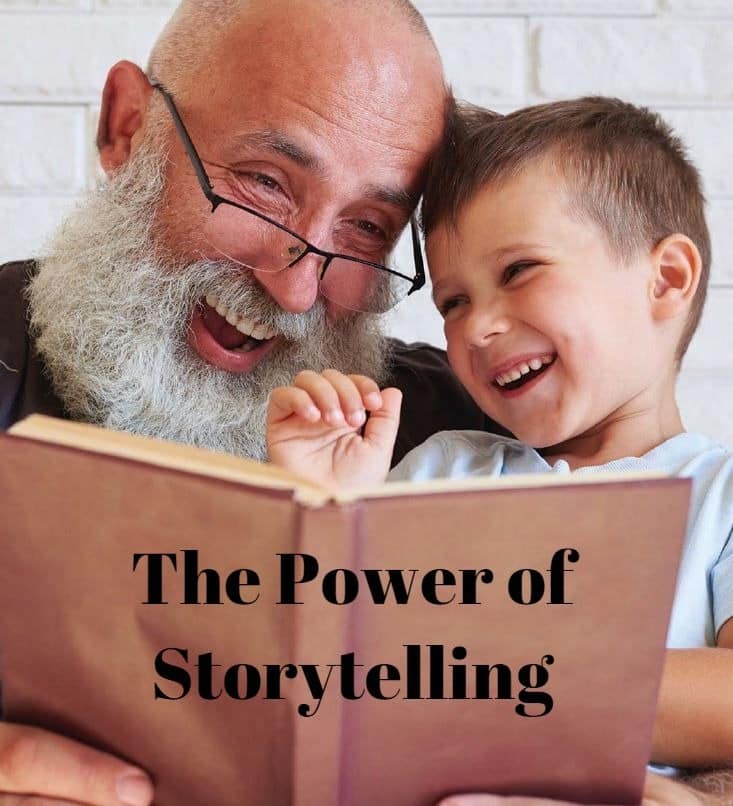

Once upon a time…
If the pen is mightier than the sword, then the classic words beginning most tales are as strong as steel. Tales scare away the monsters under the bed; they teach the difference between right and wrong; they are educators and friends and soothing presences at the end of very long days. But how did storytelling get so powerful?
Before typewriters and ballpoint pens and, well, any ink on paper, there was only the spoken word. Words that would warn of danger or delight a little child or sing a song of days gone by. All these things that were to be remembered and repeated over and over and, frequently, modified over time. To reflect new realities or, perhaps, because our memories are only so good. But why are stories so important to a child?
It’s because there is an undeniably important relationship between the storyteller and the listener. It is a relationship of trust: the listener believes the storyteller implicitly. It is a relationship of love: the listener is focused on the elusive, illustrative spoken words and on the art of storytelling. You don’t have to be an amazing storyteller or have a particularly receptive listener; all you need is a “once upon a time” said in a calm, barely audible voice.
But, arguably, a parent that reads to a child not only entertains and ritualizes the steps to falling asleep: they also cultivate the curiosity of their child to figure out how those lines, dots, and curves in the book translate into words they themselves will want to read. But what of audiobooks?
Audiobooks are not just a practical commodity, in our ever-busy world, when we run out of time to read to our children. They silence the mind and the body, by giving it something peaceful to focus on. They also continue the important work of teaching a child new words and how to pronounce them: as we read or as we listen to words, our mouths move fractionally to mimic them, as though we’re saying them to ourselves. Our body, so in tune with the story, keeps the story physically alive within us, by following the pattern, the rhythm and the dance of language.
We also learn by repetition, by hearing “no” a few too many times, by testing boundaries but also by listening to stories about consent, about sharing, about caring for one another. It’s fascinating how children, so hungry for knowledge, digest new ideas and concepts much faster than adults whether that’s recent talks about sexuality, human rights, or even epidemics.
If there is one takeaway from storytelling that I would tell any parent, it’s this: sit down with your child and try telling a story on the spot. No matter how self-conscious you feel, no matter how original or unoriginal that story might become, your master storyteller of a child will listen. Because storytellers are always on the lookout for new stories and children make-believe their very first ones. So, once upon a time….
Emma Edger is a graduate of the Theatre and Development program at Concordia University and the creator of YouTube channel “Emma’s Storytime”. “Emma’s Storytime” was created as a reaction to the COVID-19 epidemic; Emma wanted to continue giving of herself and of her talents as the theatre and film communities came to (and continue to be at) a standstill. She started writing and narrating stories for young children, hoping it would entertain and educate toddlers while giving parents a much deserved – and needed – break. Her most recent stories are “Your Body Is Your Body, Billy” (teaching different aspects of consent) and “Sarah the Superhappy Hero” (explaining the COVID-19 epidemic in simpler terms to kids and proposing ways that they can help)
Related Stories

Back-to-School Countdown: 10 Fun Can’t-Miss Events and Activities Before Summer
Whether you're looking to create lasting memories or simply make the most of the remaining vacation days, we've put together a list of some can't-miss events and activities before summer ends for you.

Sunkissed and Smiling: Top 10 Summer Activities to check out
Whether you're at home or venturing out, here are the top summer activities that will have your whole crew feeling sun-kissed and smiling.







